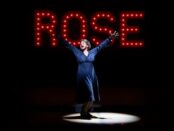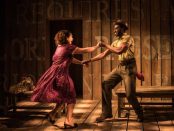Jordan Tyson
The Notebook: The Musical
While the characters age, the use of diversity here has them switch races, so that while one couple has a Black Allie and a white Noah, another has a white Allie and a Black Noah, as well as Allie’s parents being played by an interracial couple. Although it is easy to follow, it is somewhat distracting until one gets used to it. The setting has also been updated from the 1940’s to the 1960’s so that Noah fights in Vietnam now rather than World War II. Brunstetter’s book is faithful to both the novel and the movie, except that while the earlier two versions were recounted by the older Noah reading to his increasingly distracted wife from the notebook that she wrote in chronological order, here there are flashbacks within flashbacks, backtracking some of the events. Brunstetter has also made the ending more explicit than either the book or the film, as well as keeping much of the original sentimentality at bay. [more]
The Streets of New York
Cue the Irish Rep and its remounting of artistic director Charlotte Moore's musical "The Streets of New York," which the theatre first premiered twenty years ago in the aftermath of September 11. An affectionate adaptation of Dion Boucicault's 1857 melodrama "The Poor of New York," it returns in the wake of a different tragedy--a global pandemic that has claimed nearly 800,000 American lives and more than five million human beings worldwide--sharing the same social conscience as the Dickens classic but also encouraging the audience to do something more fun and cathartic: hiss at the greedy old man. Perhaps it's the Christmas story we actually need this year. [more]
Folk Wandering
They’re friends in the present. Someone picks up yellowed newspaper articles from the past. Then we’re in New York City’s Lower East Side in 1911. We meet the spunky 13-year-old Roselia. She is the daughter of immigrants and her goal is to become a muckraking journalist. An exposé of the local butcher was one of her scoops that have been published. Her older sister is to marry a genial young man. Her parents are very affectionate but due to their hardscrabble circumstances it’s decided that after her impending 14th birthday, Roselia will leave school to join her mother and sister in working in a garment factory to bring in more money to the family. This heartbreaking thread is the most substantive, affective and dramatic of the three tales. The girlish and luminous Lena Hudson makes a great impact as Roselia. Kate Loprest’s practical but maternal characterization of the mother is perfect. “The House on Ludlow Street” is a haunting song that is woven through the narrative. [more]
Sweetee
"Sweetee" is an admirable attempt to depict determination in the face of prejudice in the Deep South 80 years ago. While the cast appears to be older than their characters, they make a valiant attempt to make more out of the material than the show has going for it. Unfortunately, "Sweetee" seems rather thin considering the possibilities inherent in the story line. The score is pleasant but innocuous and unmemorable, always a deal breaker in a musical. Ironically, the most effective musical numbers are the actual interpolated hymns: "Amazing Grace," "This Little Light of Mine," and "Joyful, Joyful." [more]





